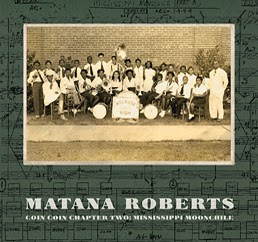2014-02-13
ANNE CHOQUET / Foehn (Petit label)
Une autre belle
production très limitée du Petit Label (100 exemplaires sur CDr, pochette
cartonnée sérigraphiée). Anne Choquet joue des flûtes à bec. Techniques
étendues, multiphonie, brassage d’objets, le tout enregisté dans une chapelle
aux propriétés acoustiques enveloppantes. Pièces courtes, bien centrées,
formant une séquence qui varie les approches. Une musique épurée qui rappelle
tout le potentiel de la flûte à bec (ici utilisée sous plusieurs déclinaisons).
Another fine ultra-limited production from Petit Label
(CDr, 100 copies, serigraphed cardboard sleeve). Anne Choquet plays recorders.
Extended techniques, multiphonics, objects, all recorded in a chapel with
enveloping acoustics. Short pieces, well centered, forming a sequence of
diverse approaches. Stripped-down music that reminds us of all the potential of
the recorder family.
JULIEN DESPREZ / Acapulco (Coax
Records)
Mini-album du
guitariste des groupes IRèNE et Radiation 10. Trois pièces, cinq à sept minutes
chacune, de guitare solo. Approche bruitiste, avec préparations, violences,
crachottements d’amplificateurs. Ça m’évoque René Lussier à l’époque de Solos de guitare électrique. Mordant,
viscéral... et court.
EP by IRèNE and Radiation 10 electric guitarist Julien
Desprez. Three solo guitar pieces, five to seven minutes each. Noise-based
approach with preparations, mangling, and amp-stuttering. Reminds me of René
Lussier circa Solos de guitare
électrique. Raw, visceral... and short.
Vous cherchez un
disque qui tape fort et jamais là où vous l’attendez? Paf! Hipsters Gone Ballistic n’en finit plus de décocher des crochets
ravegeurs. Compositions ultra-serrées qui empruntent un jazz-punk et à
l’avant-prog, un véritable feu roulant. Avec le guitariste Jasper Stadhouders
(aussi dans Lily’s Déjà Vu), Gonçalo Almeida à la basse, le batteur Philipp
Moser, et surtout la première ligne composée du trompettiste Gijs Levelt et du
saxo Tobias Klein. Recommandé! [Ci-dessous: Un montage d’extraits de l’album.]
Looking for a record that hits hard and never where
you expect it? Bam! Hipsters
Gone Ballistic is a neverending flurry of
pops to the jaw. Ultratight tunes borrowing from jazz-punk and avant-prog. With
guitarist Jasper Stadhouders (also in Lily’s Déjà Vu), Gonçalo Almeida on bass,
drummer Philipp Moser, and most of all the dual frontline of Gijs Levelt
(trumpet) and Tobias Klein (alto sax). Recommended. [Below: A collage of excerpts of the
album.]
DEERHOOF & MARC RIBOT’S CERAMIC DOG / Split 7 (Northern Spy)
Ce 45 tours partagé
sortira à l’occasion du Record Store Day – j’ai eu droit à une version
numérique. Face A: Deerhoof invite le guitariste Marc Ribot à jouer sur une de
leurs pièces instrumentales déjà parues (“Qui Dorm, Només Somia”, retitrée pour
l’occasion “Who Sleeps, Only Dreams”); celui-ci y va d’un solo malade. Face B:
“Hide with Me” de Ceramic Dog, qui date de 2007. Et qui est étonnamment pesante
– un vrai headbanger.
This split 45rpm will come out for Record Store Day –
I was offered the digital version. Side A: Deerhoof invites Marc Ribot to play
on an already-released instrumental track (“Qui Dorm, Només Somia,” retitled
“Who Sleeps, Only Dreams”); Ribot delivers a mad solo. Side B: “Hide with Me”
by Ceramic Dog, a recording from 2007, surprisingly heavy – a real headbanger.
DAN THOUIN / Oscilloscope (La Tribu)
Paru en 2004, mais je
suis tombé dessus récemment à très petit prix. J’ai mordu à l’hameçon: après
tout, Thouin est le claviériste de Fred Fortin, entre autres choses, et un
solide organiste. Or, il n’y a pas d’orgue sur Oscilloscope, un projet pluristylistique et un disque déroutant. La
plupart des chansons mettent en vedette un chanteur invité. Certaines sont des
reprises. Toutes font usage d’échantillons. On va du trip hippie au jungle, en
passant par une version techno de “Possession” de (et avec) Pierre Flynn qui est
particulièrement détestable. Pur hasard en ce jour d’anniversaire de Raôul
Duguay, l’album se termine sur un long soliloque du poète (“L’étoile dans le
coeur”) suivi d’une version fort respectable de “Le voyage” (retitrée “La
vérité”). Intérêt mitigé au final.
Released in 2004, but I recently stumbled on a copy at
a very low price. So I went ahead and bought it – after all, Thouin is Fred
Fortin’s keyboardist (among other things) and a strong organ player to boot.
Except there’s no organ on Oscilloscope, a pluri-stylistic project... and a
scattered record. Most tracks feature guest singers. Some are covers. All make
extensive use of sampling. And they range from a hippy flight to jungle music.
There’s an awful techno take of Pierre Flynn’s ‘80s hit “Possession”. However,
and this is pure synchronicity as today is Raôul Duguay’s birthday, the album
concludes with a long rant by the poet and a convincing cover of his classic
song “Le voyage” (here retitled “La vérité”). Still, a mediocre record.
DOCTOR NERVE / Did Sprinting Die? (Cuneiform)
Je n’avais jamais
entendu le premier album en concert de Doctor Nerve, un groupe avant-prog que
j’aime beaucoup. Paru en 1990, enregistré en 1989, alors que le groupe n’avait
que deux albums à son actif. Huit morceaux en concert plus trois “pièces
générées par ordinateur” (le début d’une obsession chez Nick Didkovsky). Bien,
pas génial, et qualité sonore très moyenne (et mastering TRÈS faible). “Master
Stiff Fries a Dozen” et “Trash” ont droit à de solides versions, mais le groupe
publiera en 1997 un autre album live, le phénoménal Every Screaming Ear, supérieur en tous points. Du coup, Did Sprinting Die? est devenu et demeure
un disque pour collectionneur seulement.
I had never heard the first live album by Doctor
Nerve, an avant-prog band I dig a lot. Released in 1990, recorded in 1989,
while the band had only two studio albums under its belt. Eight live tracks plus
three “computer generated pieces” (the beginning of an obsession for Nick
Didkovsky. Nice, not great, and mediocre sound quality (and VERY low
mastering). “Master Stiff Fries a Dozen” and “Trash” are given strong
renditions, but the band would publish another live CD in 1997, the phenomenal Every Screaming Ear, superior in all respects. Which instantly turned Did Springting
Die? into an item for completists.



